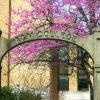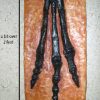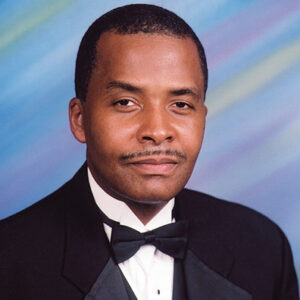calsfoundation@cals.org
Oliver Keith Baker (1959–)
Oliver Keith Baker is a Yale University physicist who has conducted groundbreaking research in particle physics and is a nationally known educator for his work on integrating technology into the classroom. He was inducted into the Arkansas Black Hall of Fame in 2006.
Oliver Baker was born on July 18, 1959, in McGehee (Desha County) to Oliver Walter Baker and Yvonne Brigham Baker of Tillar (Drew and Desha counties); he has ten siblings. His parents were both college educated, having met at what is now the University of Arkansas at Pine Bluff (UAPB). He discovered a talent for science and mathematics while in junior high. His family moved to Memphis, Tennessee, when he was in middle school.
After graduating from high school, Baker went on to study physics at the Massachusetts Institute of Technology, earning his BS in 1981. He went on to earn master’s degrees in physics and mathematics from Stanford University in 1984, followed by his PhD in physics there in 1987, his dissertation covering the topic of the nuclear resonance effect on atomic electron capture by protons. He pursued a post-doctoral fellowship at the Los Alamos National Laboratory after graduation before taking a position as instructor at North Carolina State University in 1988.
In 1989, Baker was appointed staff scientist at the Thomas Jefferson National Accelerator Facility (commonly called the Jefferson Lab) in Virginia and associate professor at Hampton University. He has also served as a visiting professor at Wayne State University (1993) and an adjunct professor of physics at Columbia University (2000–2001), in addition to serving as a consultant for the Los Alamos National Laboratory, on the Nuclear Science Division Review Committee at the Lawrence Berkeley National Laboratory, and on the Committee of Visitors for the Department of Physics at Harvard University. In 2000, Baker was named the Endowed University Professor of Physics at Hampton University. The following year, he was named dean of the School of Science, and in 2002, he became the founding director for the Center for the Study of the Origin and Structure of Matter (CSOM), a National Science Foundation Physics Frontier Center that is a partnership between Hampton University, Norfolk State University, and North Carolina A&T State University. Since 2006, Baker has served as professor of physics at Yale University.
In 2010, Baker was appointed director of the Yale Wright Laboratory, which houses the world’s most powerful tandem Van de Graaff particle accelerator. Baker was also a researcher on the ATLAS experimental team at the European Organization for Nuclear Research (CERN) in Geneva, Switzerland, playing a role in the discovery of the elusive Higgs boson particle. Baker has conducted the first measurement of the muon sticking probability in muon catalyzed fusion, as well as the first accurate measurement of the elementary amplitudes in kaon electroproduction. With various co-authors, Baker has published in such journals as Physical Review C, Nuclear Instruments and Methods in Physics Research Section A, and Physical Review Letters.
For his contributions to nuclear and particle physics, Baker received the Edward Bouchet Award from the American Physical Society and the Elmer Imes Award from the National Conference of Black Physics Students and the National Society of Black Physicists. He has also received commendations for his teaching abilities, including the E. L. Hamm Sr. Distinguished Teaching Award and the National Award for Teaching Learning and Technology.
For additional information:
“A Conversation with Oliver Keith Baker.” Barnes and… AETN. http://www.aetn.org/programs/barnesand/baker (accessed September 17, 2020).
“Oliver Baker.” The History Makers. http://www.thehistorymakers.com/biography/oliver-baker (accessed September 17, 2020).
“Oliver K. Baker.” ResearchGate. https://www.researchgate.net/profile/Oliver_Baker (accessed September 17, 2020).
Oman, Noel. “Physicist Credits His Tillar Roots.” Arkansas Democrat-Gazette, November 7, 2016, pp. 1B, 6B.
Staff of the CALS Encyclopedia of Arkansas
 Divergent Prosperity and the Arc of Reform, 1968–2022
Divergent Prosperity and the Arc of Reform, 1968–2022 Education, Higher
Education, Higher Science and Technology
Science and Technology Oliver Baker
Oliver Baker 




Comments
No comments on this entry yet.